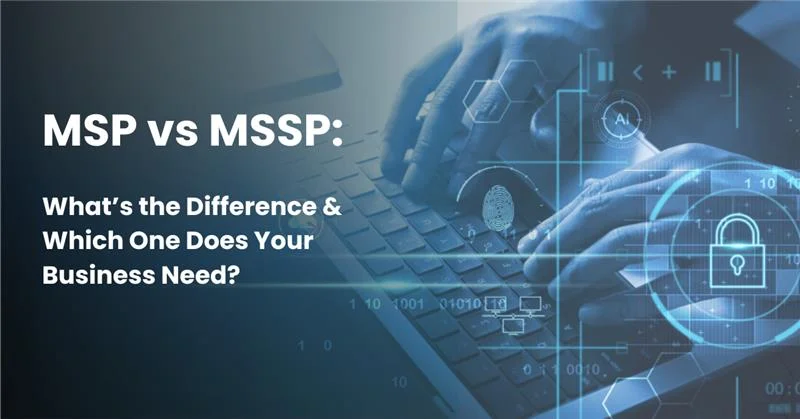Your business faces over 4,000 cyberattacks every single day. That’s not a typo. It’s the reality of today’s digital world. With threats growing more sophisticated by the minute, choosing between an MSP and an MSSP isn’t just a business call. It’s about survival.
If you’ve been trying to understand what is MSSP in cyber security or whether your current MSP cyber security setup provides enough protection, you’re not alone. Many business owners struggle to make the right decision, and mistakes here can be costly.
Let’s break it down and help you understand which solution best fits your business.
What is an MSP? Understanding managed service providers
An MSP is like your business’s full-service IT department. These teams handle everything related to your technology systems so you can stay focused on your operations.
Core MSP services and responsibilities
MSPs offer a wide range of services, including:
- IT infrastructure management — monitoring your servers, systems, and networks
- Help desk support — assisting your team with technical issues
- Network maintenance — making sure everything runs efficiently
- Basic MSP cyber security — setting up firewalls, antivirus tools, and routine safeguards
- Data backup and recovery — protecting your data from loss or system failure
Recent industry research shows that 69% of businesses rely on MSPs for primary IT support. The global MSP market is expected to hit $354.8 billion by 2026.
When does your business need an MSP?
You might need an MSP if:
- Your internal IT staff is too small or non-existent
- You want predictable IT costs
- Technology is essential to your business, but not your specialty
- You’re tired of handling unexpected outages and technical issues
What is an MSSP? MSSP definition and core functions
While MSPs are general IT experts, MSSPs focus entirely on security. Their goal is to protect your systems against cyber threats with deep expertise and advanced tools. Understanding the MSSP meaning is crucial for businesses seeking specialized cybersecurity protection.
MSSP meaning in cybersecurity
An MSSP, or Managed Security Service Provider, offers specialized cybersecurity services that go far beyond basic protection. The MSSP meaning encompasses comprehensive security monitoring, threat detection, and incident response capabilities that standard IT providers typically don’t offer.
When evaluating MSSP in cyber security, it’s important to understand that these providers offer:
- 24/7 security monitoring from a Security Operations Center (SOC)
- Advanced threat detection using AI and analytics
- Fast incident response
- Threat hunting to find hidden risks in your environment
The MSSP meaning extends beyond basic security measures to include proactive threat intelligence and behavioral analysis that helps prevent sophisticated attacks.
Top MSSP services that protect your business
When researching top MSSP providers, you’ll find they typically offer services including:
- Real-time threat monitoring with immediate alerts
- Vulnerability assessments to find weaknesses
- Compliance management for regulated industries
- Security training for your staff
- Forensic analysis in case of a breach
Studies show that businesses using top MSSP providers see 53% fewer security incidents than those relying only on basic MSP cyber security solutions.
MSP vs. MSSP: Key differences that matter
The question isn’t which is better — it’s which is better for your specific needs. Understanding what MSSP in cyber security versus traditional MSP services is helps clarify these distinctions.
Service scope: MSP cyber security vs. MSSP specialization
Here’s how they compare:
MSPs offer general IT services that include some security features like:
- Firewalls
- Antivirus tools
- Software updates
- Data backups
MSSPs, on the other hand, focus only on cybersecurity with services such as:
- Threat intelligence
- Behavioral analysis
- Custom security frameworks
- Regulatory compliance tools
The MSSP meaning involves deep specialization in security technologies and methodologies that general MSP cyber security approaches simply can’t match.
Expertise and staffing
There’s a difference in team structure:
- MSPs have general IT professionals
- MSSPs have certified security experts with credentials like CISSP and CEH
- Top MSSP providers usually respond to threats faster, often within 15 minutes
Technology stack
MSPs use tools like:
- Remote monitoring and management (RMM)
- Professional services automation (PSA)
- Basic security tools
MSSPs rely on:
- Advanced security information and event management (SIEM)
- AI-driven threat detection
- Threat intelligence databases
- Forensic investigation tools
MDR vs. MSSP: Understanding advanced security options
Managed detection and response (MDR) is a newer approach that builds on what MSSPs offer. Understanding MDR vs MSSP differences helps businesses choose the right security model.
What makes MDR different
When comparing MDR vs MSSP services:
- MDR includes proactive threat hunting
- MSSPs may focus more on prevention and monitoring
- Some top MSSP providers now offer MDR as part of their service
The MDR vs MSSP debate often comes down to whether you need reactive monitoring or proactive threat hunting capabilities.
White label MSP security provider: The hybrid solution
Some MSPs are solving the challenge by partnering with MSSPs behind the scenes through white label MSP security provider arrangements.
How white label MSSP services work
A white label MSP security provider model allows:
- MSPs to stay client-facing while outsourcing security to an MSSP
- Clients to benefit from strong IT and specialized cybersecurity through one provider
- Costs to be lower thanks to resource sharing
This white label MSP security provider model is growing fast, with a 340% increase in recent years as more businesses seek comprehensive IT and security solutions.
Top MSSP providers vs. MSP security capabilities
Your decision should match your needs and risk level. When evaluating top MSSP providers against traditional MSP cyber security options, consider your specific requirements.
When to choose each service
Choose an MSP if:
- You need general IT support
- Your cybersecurity needs are basic
- You prefer bundled IT services
- Your team lacks technical skills
Choose from top MSSP providers if:
- You operate in a high-risk industry
- You must meet strict regulations
- You’ve had past security incidents
- You need faster response and deeper protection
Making the right choice
Your choice between MSP and MSSP depends on your risk, industry, and the sensitivity of your data. A manufacturing company might do fine with basic MSP cyber security, while a hospital would need specialized services from top MSSP providers to meet HIPAA standards.
Conclusion
You don’t need to make this decision alone. Start by understanding your specific risks and goals. Then evaluate whether a general IT team or a specialized cybersecurity provider makes more sense.
IT By Design helps MSPs build effective teams and service models. Whether you need generalists, security experts, or white label MSP security provider support, we provide the staffing and guidance to help you grow securely. We work closely with MSPs to help them analyze their service gaps, scale smartly, and choose the right blend of IT and security support for their clients.
Partner with the MSP staffing expert (IT By Design) who know security inside out.
Schedule a call with us today and let IT By Design fill the gap, fix the cracks, and future-proof your growth.
FAQs about MSSP and MSP
Q1. What does MSSP stand for in cybersecurity?
A. It stands for Managed Security Service Provider — a company focused on cybersecurity monitoring, detection, and response. The MSSP meaning encompasses comprehensive security services beyond basic IT protection.
Q2.Can an MSP provide the same security as an MSSP?
A. No. MSPs offer basic protection, while MSSPs specialize in advanced security using tools and expertise MSPs typically don’t have.
Q3. What’s the main difference between MSP and MSSP?
A. MSPs manage overall IT services. MSSPs focus only on cybersecurity.
Q4. Is an MSSP more expensive than an MSP?
A. Yes, but you get advanced protection that helps prevent costly breaches.
Q5. Do I need both an MSP and an MSSP?
A. Some businesses benefit from using both. Others use an MSP with white label MSSP support.








